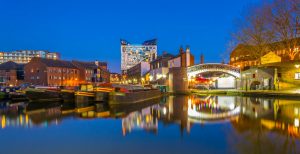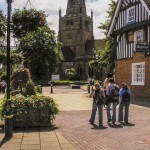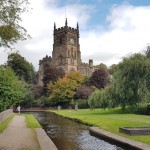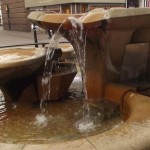
Birmingham is England’s second-largest city; home to state-of-the-art architecture, a shiny shopping centre, and buildings that have been so beautifully restored that they will take your breath away. This city is the place to be. Like London, Birmingham is the centre of so many things; making travel easy, while also offering a wealth of activities and places to go.
In a city as large as Birmingham is, it can be difficult to decide where you want to go and what you want to do. If you’re familiar with the area, you may end up visiting the same places quite frequently. While, if you’re new to the area, you may not know where anything is at all. It’s time to make a change in your Birmingham habits with this five-minute guide!

ImaGE: trabanto/Shutterstock.com
History of Birmingham.
Birmingham began its life as a Saxon village. During the early 12th century, it was able to grow into a town; mostly thanks to the King being gracious enough to allow Peter De Birmingham to begin holding a weekly market in the area. Once this market was up and running, all kinds of folks came to trade in Birmingham, and the town developed bit by bit.
In the year 1250, a yearly summer fair started occurring in Birmingham. This fair attracted even more traders and sellers from across the Midlands area. Medieval Birmingham was known for its wool industry, where the wool was both woven and dyed in the town. By the latter end of the 14th century, Birmingham also became famous for its metalworking and leatherworking.
Hospitals were built, as was the Old Crown House; and by the 1500s, Birmingham had become a small market town of 1,500 people. From there, it was only natural that the town grew fast. By 1650, just a century and a half later, Birmingham had a population of 5,000 people. It had become somewhere large, important, and extremely busy.
In the middle of the 16th century, a grammar school was founded in Birmingham; bringing scholars to a town of tradesmen and blacksmiths. Birmingham, despite some of its historical setbacks (such as the civil war of 1642, the smallpox epidemic of the late 1800s, and the catastrophic events of the Second World War when Birmingham was a target for bombing), has grown and grown over the years.
After the war, we saw the rise of Birmingham as a booming city. Thousands of homes have been built, new Universities have been erected, and New Street station has been rebuilt and renovated a couple of times, too. In addition, Birmingham gained the Bullring Shopping Centre in 1964, which has expanded over time.
Today, we have a city known for its financial prowess and its tourism industry. A city with a population of over one million people. A city at the centre of England, that can take you anywhere.
What to do in Birmingham
The top attraction in Birmingham has to be Cadbury’s World. Everyone knows about it, and plenty of school trips happen within its walls. You can see exactly how Cadbury’s chocolate is made and sit through a short presentation of the history of the company before getting on their magical tour ride. There’s even a 4D Chocolate Adventure zone for a cinema experience like no other! It’s really easy to get 2-for-1 admission to Cadbury’s World, too.
But there are hundreds of other activities in Birmingham, from live music to museums. Plus of course, it has a network of canals which makes Venice jealous. Ol that’s an exaggeration, but they have a lot and they have been beautifully maintained. Check out some of our favourite places below:
Shopping
This wouldn’t be an article about Birmingham if we didn’t mention the Bullring. Directly across from Grand Central Station, Birmingham’s famous Bullring is a shining shopping centre with plenty of places to shop in. The Bullring is teamed up with the upper floor of New Street station, where there are even more places to shop and eat.
Recently, Birmingham constructed and opened the biggest Primark store around. This megastore has two entrances, both just moments away from two of Birmingham’s train stations. It took three years to build, has five floors, and employs over 1000 members of staff to keep the store (and its restaurants) running. There’s even a salon in the store. It has everything you need, from the latest trends to amazing eateries.
If you’re not looking to spend the day indoors at Primark or the Bullring, then hit the High Street. Birmingham is absolutely full to the brim of various stores, including Lush, Claire’s, Waterstones, and more. Head down to China Town for a cultural experience like no other and find even more places to shop until you drop.
Food and Drink
You can’t walk for two minutes in Birmingham city centre without seeing five or so different places to eat and drink. Further afield, there are a few less, but Birmingham is still stuffed to the brim with places looking to invite you in to try their food. That’s to say nothing of all of the independent restaurants, cafés, and bars, too!
From budget to classy, finding somewhere to eat in Birmingham is like finding somewhere to stop: There’s too many places. Yo! Sushi in Grand Central is perfect for a quick bite of fresh food, or you can take a seat in Gaijin sushi for a minimalist Japanese experience. Ming Moon is the place to be for karaoke nights and all-you-can-eat buffets, while Carters is a high-end restaurant that still has a friendly atmosphere. It’d take us all day to list the different restaurants and cafés that exist in Birmingham, so we’ll leave you with those few and this piece of advice: Choose a cuisine type, check reviews, and go and try it!
If you’re in doubt, just wander around the city and walk in to somewhere that looks and smells amazing.
Music and Entertainment
There are plenty of concerts and gigs in Birmingham, and not just only in the O2 Academy. Symphony Hall gets plenty of guests, as does the O2 Institute, The Mill, the Arena, and more locations. You can see anniversary performances, comebacks, Opera shows, and gain a lot of theatre appreciation from Birmingham’s performing arts businesses.
As for entertainment, why not try Mr. Mulligans Adventure Golf or enjoy an off-road Land Rover Experience in Solihull? If neither of these attractions take your fancy, there’s also the Black Country Living Museum, a place full of history that spans over 300 years.
If you’re not looking to pay too much, just hit the clubs! Or, if you walk around the High Street during the day, there are usually five to ten different buskers playing for the public over the span of two to three streets.
Travelling in Birmingham
Travelling in and around Birmingham couldn’t be easier. There are trams, buses, and trains to take you where you want to go. If you’re visiting the NEC, you only need to hop on a train that takes you to Birmingham International from the main station, Birmingham New Street.
Birmingham New Street in Grand Central Station is the most used train station, but there is also Snow Hill, International, and Moor Street. All of Birmingham’s train stations can take you to London, and Birmingham International station comes out directly next to Birmingham Airport.
The West Midlands Metro system runs in Birmingham and goes all the way to Wolverhampton and back. There are stops within Bilston, Wednesbury, West Bromwich, The Hawthorns and the Jewellery Quarter. The Metro runs approximately every 6 to 8 minutes during the day and every 15 minutes during the evening and on Sundays. A one-day Metro pass is just £5.50 with unlimited travel, and £4 during off-peak hours.
There are also buses that run all over Birmingham, with many taking you to popular destinations. in 2019 a Daysaver for Birmingham’s buses is £4.60, while a single is from £1.50 to £2.40.
Places to stay in Birmingham
There are plenty of budget hotels in Birmingham, including Travelodge branches that are ridiculously close to transport links. There’s a Travelodge on Newhall Street, one near the Bullring, and another in Central Broadway Plaza.
According to Google, some of the highest-rated hotels in Birmingham include Fairlawns Hotel and Spa, as well as The Edgbaston Hotel and Elmdon Lodge Hotel. The price range per night is typically between £30 to £100 in Birmingham. In the city centre, near the Bullring, you can find Premier Inns, Radisson hotels, and even budget Ibis hotels. A little further out, the Hilton Hotel can be found near Birmingham NEC, alongside many other well-known hotels and facilities.
Alternatively, consider booking a rentable suite or apartment, such as Staybridge Suites. Air BnB is also popular in Birmingham, and there are some absolutely wonderful places to stay. Who wants to stay in a room in a hotel when you and your group can stay in lakeside Georgian mansion? Granted those are usually a lot per night, but it’s a nice thought. There are plenty of full apartments to rent for a night or two, instead.





